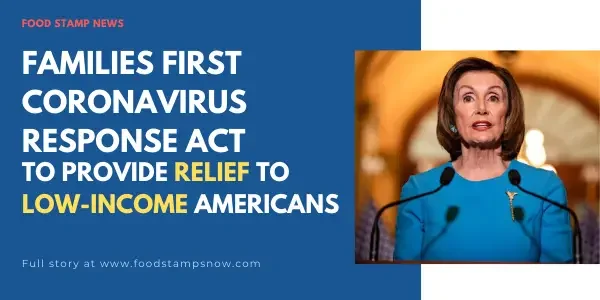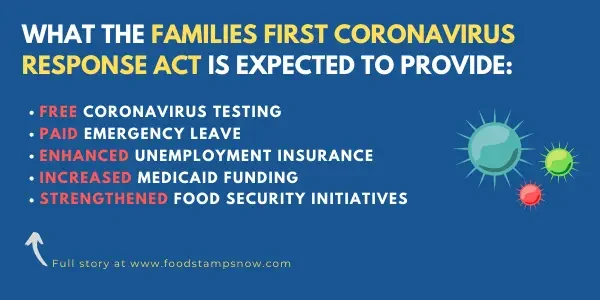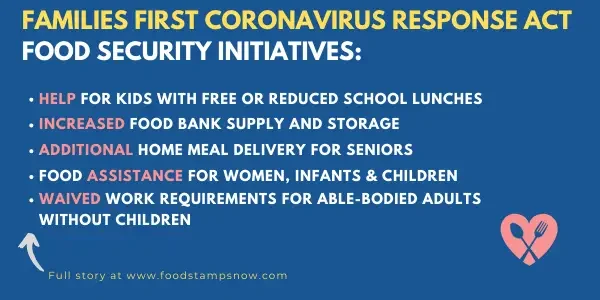With the Coronavirus (COVID-19) pandemic sweeping the United States, the public is being urged to cancel all their plans. This includes any planned visits to high traffic, high population areas and events. This has resulted in a number of school closures, event cancellations, and business closures around the nation.
For those individuals and households that are receiving government assistance to meet their basic needs, this time is all that much harder and more stressful. Low-income Americans face the highest risk due to the lack of access to healthcare and nutritional food. As a result, they face a greater crisis than most.
Luckily our Speaker of the House, Nancy Pelosi has been working on a bill to help provide relief to those low-income Americans facing crisis during the Coronavirus pandemic. The Families First Coronavirus Response Act (FFCRA) is currently scheduled to be passed today.
The legislation is expected to provide support and relief to those families most at-risk for being affected by the Coronavirus. Here’s what we know so far about the Families First Coronavirus Act.
[the_ad id=”3802″]
Families First Coronavirus Response Act
The Families First Coronavirus Response Act will provide assistance to low-income American families during the Coronavirus outbreak. The bill aims to provide support and peace of mind to those families that are considered to be the first priority during a crisis.
Low-income families that are currently receiving government assistance are considered to be the most at-risk due to the lack of access to resources. According to a statement released by Speaker of the House, Nancy Polosi–
“The FFCRA is focused directly on providing support for America’s families, who must be our first priority in this emergency. We cannot fight coronavirus effectively unless everyone in our country who needs to be tested knows they can get their test free of charge. We cannot slow the coronavirus outbreak when workers are stuck with the terrible choice between staying home to avoid spreading illness and the paycheck their family can’t afford to lose.”
The goal of the legislation is provide support and relief to those families facing crisis during the Coronavirus outbreak.
What the Families First Coronavirus Response Act is expected to provide:
- Free Coronavirus Testing
- Paid Emergency Leave
- Enhanced Unemployment Insurance
- Increased Medicaid Funding
- Strengthened Food Security Initiatives
For more details and information on each of the proposed areas of support, continue reading below.
Free Coronavirus Testing
When the Families First Coronavirus Response Act is passed, free Coronavirus testing will be available to anyone who needs it–including the uninsured. Testing for COVID-19 is available in every state.
Coronavirus Symptoms
According to the Centers for Disease Control and Prevention (CDC), Coronavirus symptoms can range from mild to severe. Symptoms of fever, cough, and shortness of breath may appear 2-14 days after exposure.
Symptoms are generally more severe in those that are considered “at-risk.” Individuals that have been found to be most at-risk are those with underlying conditions, struggle with obesity, smoke, and are older in age.
What To Do if you Think you have Coronavirus
During this time it is of the utmost importance that you limit your exposure. The CDC recommends that you wash your hands and disinfect surfaces frequently, stay home, avoid public areas, and do not use public transportation.
If you think you may have Coronavirus, you are instructed to contact your local state health department. Click here to find the closest Coronavirus testing location to you.
Paid Emergency Leave
The paid emergency leave included in the Families First Coronavirus Response Act covers both 14 days of paid sick leave and up to three months of paid family and medical leave. This allows low-income individuals affected by the Coronavirus to stay home and get better. It also limits the exposure when it comes to putting more people at-risk.
Paid Emergency Leave benefits are expected to equal two-thirds of prior average wages. These benefits are not taxable and include a monthly cap at $4,000.
Enhanced Unemployment Insurance
The legislation provides a temporary increase in the distribution of unemployment insurance (UI) benefits. This effort will extend protections to furloughed workers and provide economic security to those that may lose their job as a result of the virus.
This initiative promotes short-term compensation programs through the state including 100 percent federal funding to extended benefits (EB) programs. Enhancing the Unemployment Insurance initiative will also ease the UI eligibility requirements for those that have been affected by Coronavirus.
Increased Medicaid Funding
The legislation increases the federal share of Medicaid funding by eight percentage points, but only if states maintain or increase current eligibility and other program standards. This is an effort to help support states as they experience increased Medicaid spending.
Strengthened Food Security Initiatives
The Families First Coronavirus Response Act will expand several food initiative programs in an effort to support those facing food insecurity.
Key Food Security Initiatives:
- Households with children receiving free school meals will be provided with food benefits
- Food banks will receive increased food supply and storage for affected households
- The Senior SNAP will provide additional home-delivered meals to low-income seniors
- Able-bodied adults without children do not have to meet work requirements
- WIC assistance will be increased for those at-risk of losing their job
We have highlighted the details of the legislation for each initiative below.
[the_ad id=”3802″]
Children Receiving School Meals
With school closures due to COVID-19 outbreak, kids receiving assistance cannot get their normal meal program. The Families First Coronavirus Response Act will provide temporary assistance benefits to those households with children that receive free or reduced school meals. The benefits will be distributed through the Supplemental Nutrition Assistance Program.
Food Banks to Increase Capacity
The legislation will provide the Emergency Food Assistance Program (TEFAP) with a $400 million increase in funding. This will help local food banks get more food and increase their storage capacity for that food. The increased food supply aims to provide additional assistance to more local low-income families.
Home Meal Delivery for Seniors
Low-income or disabled seniors that have been affected by Coronavirus or are homebound will be provided with home-delivered meals. The legislation will provide the Senior Nutrition Program with an injection of $250 million, which will provide 25 million additional delivered meals to low-income seniors.
Work Requirements for Able Bodied Adults without Children
The Families First Coronavirus Response Act will postpone the work requirements bill for able-bodied adults without dependents (ABAWD). The bill scheduled to go into effect on April 1, 2020 requires ABAWD food stamp recipients to work a minimum of 20 hours per week. The government confirms that SNAP work requirements will be paused for the duration of the Coronavirus public health crisis.
Increased Assistance for Women, Infant & Children
The special Supplemental Nutrition Assistance Program for Women, Infants and Children (WIC) is expected to receive a cash surge of $500 million. This will help parents with young children that are at-risk of losing their jobs or getting laid off because of the Coronavirus.
Families First Coronavirus Response Act Updates
According to Speaker Pelosi, the Families First Coronavirus Response Act is expected to be passed today, Friday, March 13th. We will continue to update this story and provide additional information as it becomes available.
For more news on food stamps as the Coronavirus develops, follow our blog here.




